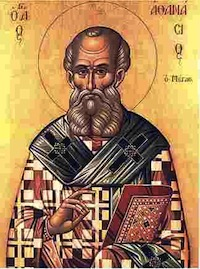St Athanasius

Bishop. Patriarch of Alexandria. Born in 296, to Christian parents, Athanasius became deacon and secretary to Bishop Alexander. He attended the Council of Nicea in 325, which condemned the Arian heresy (that denied the eternity of the Word of God and the Divinity of Christ).
The Creed formulated during this first General Council of the church is part of Christian belief today. Athanasius was a vigorous defender of Christian orthodoxy all his life.
In 328, he became bishop and made many pastoral visits throughout his province. For many years he became the target of bitter attacks by Arians and Meletians.
Much of his life was spent in exile in Trier, Rome, and country districts outside Alexandria where many of his flock followed him. During these periods he wrote extensively.
In 365, after the death of the emperor Constantius, he returned to his diocese for the last time and his diocese enjoyed a great spiritual revival. There were many candidates for the monastic life. He made many pastoral visits and huge crowds came to hear him preach.
St Athanasius was described as a man small in stature but of towering spirit.
Newman said he was the "principle instrument after the Apostles by which the sacred truths of Christianity have been conveyed and secured to the world."
As well as his writings against the Arians, he wrote several works including the Life of St Anthony, commentaries on the Scriptures. An eighth century monk wrote: "If you find a book by Athanasius and have no paper on which to copy it, write it on your shirt."
St Athanasius died in 373. He is one of the four great Greek doctors of the church together with St Basil the Great, St John Chrysostom, and St Gregory of Nazianzus.












